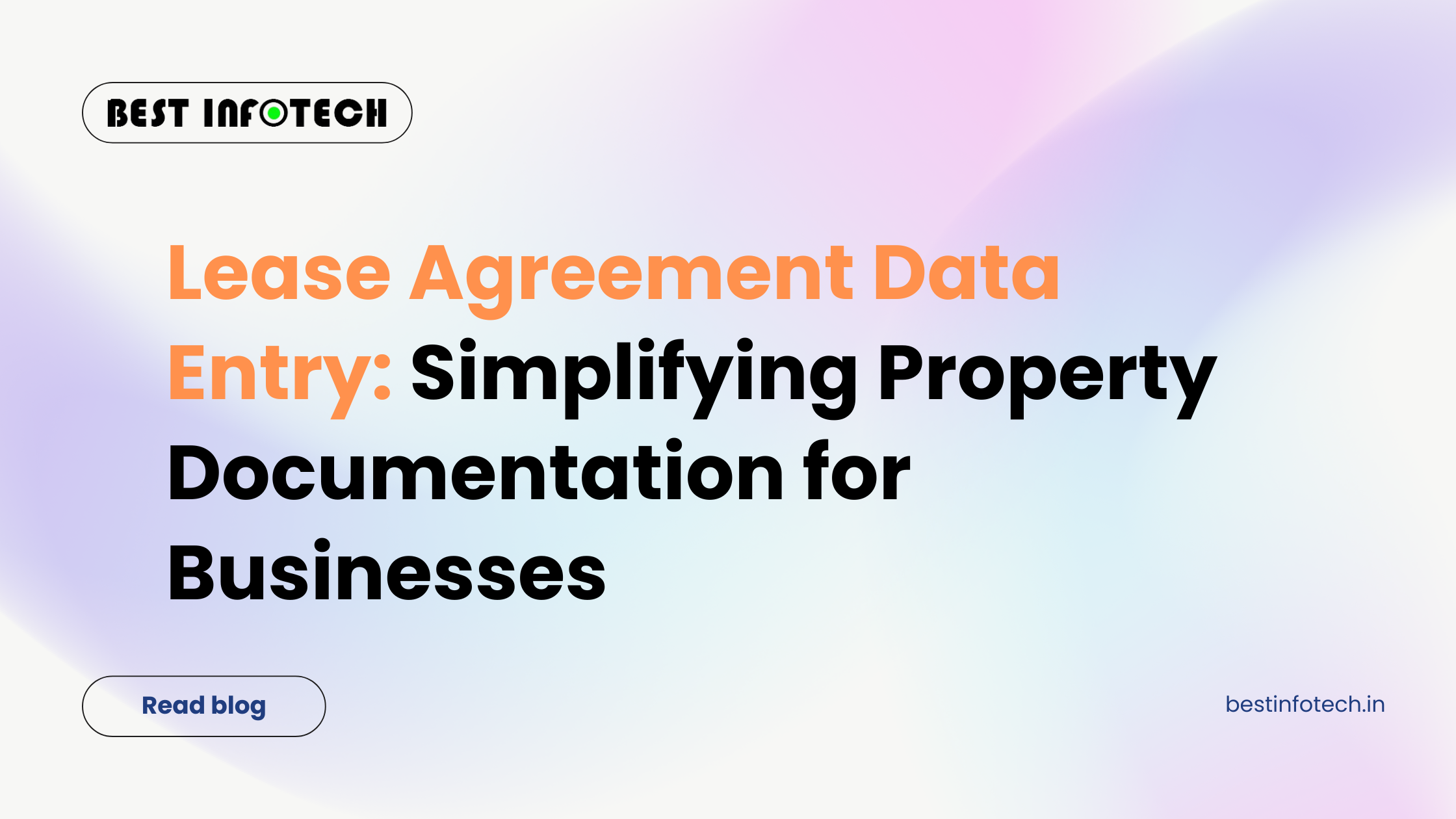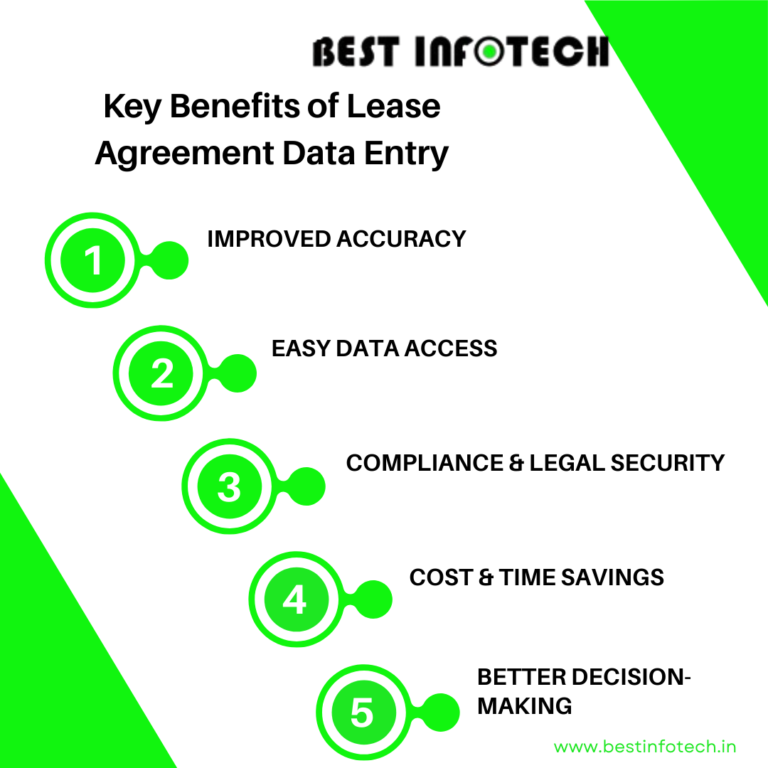Lease Agreement Data Entry: Simplifying Property Documentation for Businesses
 August 21, 2025
August 21, 2025 
Lease agreements are legal documents that outline the rights and responsibilities of landlords and tenants. These documents include details like property description, rental amounts, payment deadlines, renewal terms, and security deposits.
Without proper lease agreement data entry, businesses risk:
Errors in payment records leading to disputes.
Missed renewal dates that could result in financial losses.
Difficulty in retrieving records when needed for audits or compliance.
Time wasted on manual searches instead of focusing on core operations.
By digitizing and organizing lease agreement data, companies ensure smooth operations, better record-keeping, and compliance with legal requirements.

Key Benefits of Lease Agreement Data Entry
Outsourcing or using professional lease data entry services provides several advantages:
1. Improved Accuracy
Professional data entry specialists carefully extract information from physical lease agreements and input them into digital systems, minimizing errors.
2. Easy Data Access
Digitized lease agreements can be stored in databases or document management systems, allowing quick search and retrieval whenever required.
3. Compliance & Legal Security
Accurate documentation ensures businesses stay compliant with laws and avoid disputes with tenants or property managers.
4. Cost & Time Savings
Manual paperwork can be tedious. Outsourcing lease agreement data entry reduces administrative workload and helps businesses save both time and resources.
5. Better Decision-Making
Having well-organized lease records allows property managers and businesses to analyze rental trends, payment histories, and renewal cycles effectively.
What Information is Captured in Lease Agreement Data Entry?
A well-structured lease agreement data entry process captures all relevant information for easy management. Some of the critical details include:
Tenant Information – Name, contact details, ID proof.
Property Details – Address, size, type of property.
Lease Terms – Start and end date, duration of lease.
Rental Information – Monthly rent, payment method, due date.
Security Deposits – Amount paid, refund conditions.
Renewal & Termination Clauses – Notice periods, penalties.
Additional Agreements – Parking, maintenance, utility charges.
Storing this information digitally helps businesses manage hundreds or even thousands of lease agreements efficiently.
Industries That Rely on Lease Agreement Data Entry
Lease data entry is not limited to property management companies—it benefits multiple industries:
1. Real Estate Agencies
They manage hundreds of rental and lease contracts. Accurate data entry ensures smooth property management and client trust.
2. Corporate Companies
Large corporations lease office spaces, warehouses, and retail outlets. They need structured lease data for compliance and financial management.
3. Banks & Financial Institutions
Leased properties often act as collateral. Proper lease agreement data entry ensures accurate record-keeping for legal and financial purposes.
4. Hospitals & Educational Institutions
Many lease medical facilities, hostels, or training centers. Data entry helps in managing multiple agreements without errors.
5. Government Agencies
They handle thousands of property lease agreements for housing, offices, and public facilities. Digitization ensures transparency and accessibility.
Why Outsource Lease Agreement Data Entry?
Businesses often choose to outsource data entry to professionals for several reasons:
Expertise in handling large volumes of lease records.
Faster turnaround time with trained staff.
Access to advanced tools like OCR (Optical Character Recognition) for digitizing scanned documents.
Confidentiality and data security protocols to protect sensitive information.
Scalability, as outsourcing partners can handle growing workloads with ease.
By outsourcing, companies can focus on growth while ensuring accurate documentation.
How Lease Agreement Data Entry Streamlines Property Management
Accurate lease agreement data entry brings structure and clarity to property documentation. Here’s how it helps property managers and businesses:
Centralized database for all lease agreements.
Automated reminders for rent collection and lease renewals.
Quick access to agreements for legal or compliance checks.
Reduced disputes with tenants due to accurate documentation.
Analytics and reports on rental income, tenant history, and occupancy trends.
When lease agreements are properly digitized and indexed, property managers can focus on expanding portfolios instead of wasting time on paperwork.
Best Practices for Lease Agreement Data Entry
To get the most out of lease agreement digitization, businesses should follow these practices:
Standardized Data Fields – Create a template to ensure uniform data entry.
Double-Check Accuracy – Review lease information before finalizing records.
Use OCR Technology – Automate data extraction from scanned agreements.
Maintain Data Security – Protect tenant and property details with secure systems.
Regular Updates – Keep records up-to-date with renewals, modifications, or terminations.
Final Thoughts
In today’s competitive real estate and business environment, lease agreement data entry is not just a convenience—it’s a necessity. Properly digitized lease records save time, prevent errors, and ensure legal compliance. Whether you are a property manager, corporate business, or financial institution, investing in professional lease data entry services helps streamline operations and improves decision-making.
Ready to Digitize Your Lease Agreements?
Best Infotech Chennai, we specialize in accurate and secure lease agreement data entry services tailored to your business needs. Our expert team ensures error-free documentation, faster turnaround, and complete data confidentiality.
👉 Contact us today to discuss your lease agreement data entry requirements and get a customized solution for your business.
Contact us today